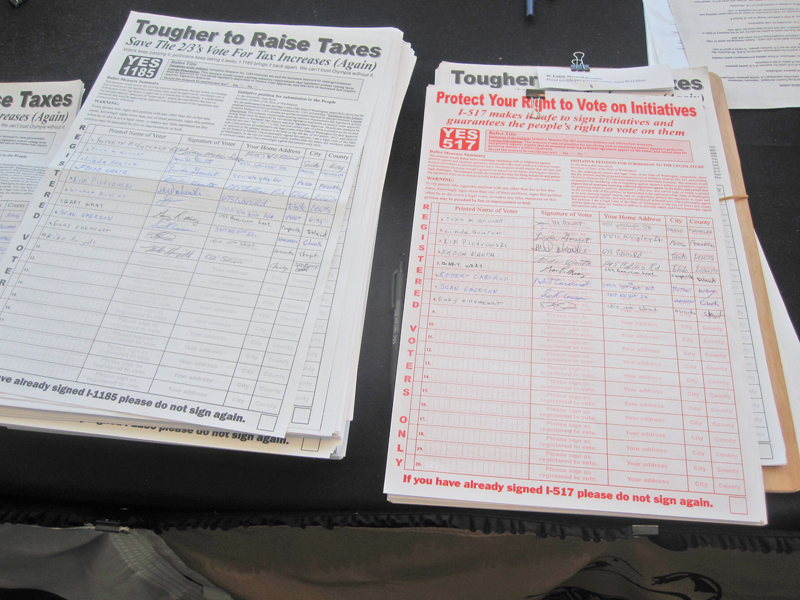
Initiative 517 was circulated alongside the business-backed I-1185 during this year’s signature-gathering season. Washington State Wire caught this shot at the state Republican convention June 1.
Updated Aug. 22
OLYMPIA, Aug. 21.—An under-the-radar initiative circulated by ballot-measure wunderkind Tim Eyman has been placed under the spotlight by a complaint filed Monday with the state Public Disclosure Commission by onetime ally Sherry Bockwinkel. The argument is one thing, but the fact is, this might be the first time anyone has taken note of Initiative 517 at all.
Bockwinkel is saying Eyman failed to file paperwork in a timely fashion for the measure, an initiative to the Legislature that would block efforts to restrict signature gathering and make it easier to score a place on the ballot. Eyman insists he did everything according to Hoyle and has records to prove it. What the flap really does is to call attention to the least-noticed of this year’s signature drives – a petition that was circulated in tandem with I-1185, the well-funded business-backed measure that would extend the Legislature’s two-thirds-for-taxes rule.
There’s a reason I-517 hasn’t gotten much public attention. It’s an initiative to the Legislature, meaning that it’s not aimed at the November ballot. Eyman has until the end of the year to collect the needed 241,153 signatures. If it is placed before the Legislature and lawmakers say no it goes to voters in 2013. Yet the drive did rankle at least a few of the business sponsors of 1185 when they saw paid canvassers carrying both petitions. One of 517’s provisions reaffirms the right of canvassers to collect signatures at the entrances and exits of any store – a big irritation for many in the state’s business community.
The initiative declares that the public’s right to place measures on the ballot is under attack by private and governmental forces, “subjected to hostility, interference and threats of interference.” It points out that the initiative process occupies a special protected status under the state constitution, which states that “the first power reserved by the people is the initiative.” Indeed, lawmakers seem every session to introduce bills that would restrict the signature gathering process. Most such efforts fall short, but every year they begin anew.
Extends Deadlines
The measure’s most significant provision extends the window of time during which signatures may be gathered. Initiatives to the people could be filed 16 months in advance of an election, rather than the current 10. That means the most commonly used type of ballot measure would have six more months for signatures, and a better shot at hitting the mark.
The measure also imposes penalties for interfering with signature gatherers, including pushing, shoving, touching, spitting, throwing objects, yelling, screaming, being verbally abusive or committing other “tumultuous conduct,” blocking or intimidating, or “maintaining an intimidating presence” within 25 feet of any person gathering signatures and anyone trying to sign a petition. It states that signature gathering is a legally protected activity on all sidewalks and walkways that carry pedestrian traffic, as well as outside entrances to public buildings, sports arenas and stores.
Circulated in Tandem
Canvassers started circulating petitions for I-517 sometime after the signature drive for I-1185 had begun. Doing the work was Citizen Solutions, the firm that was paid to circulate the 1185 petitions. Washington State Wire noticed the measure for the first time on June 1, as it was being circulated alongside I-1185 by canvassers at the state Republican convention. There’s nothing unusual about canvassers who carry more than one petition; most carry several. And occasionally one campaign piggy-backs on another, as in 2010, when paid canvassers circulated petitions free-of-charge for a marijuana-legalization measure as a way to attract signers to their tables. Bockwinkel says there’s more of a connection here: She says canvassers were told they would be paid on I-1185 only if they collected signatures for I-517. Eyman disputes that. “We only paid Citizen Solutions for 1185 signatures, and I know that Citizen Solutions only paid for 1185 signatures, so the short answer is that is not true,” he said.
The I-517 petitions continue to circulate at major public gatherings – including at Seattle’s Hempfest over the weekend.
Bockwinkel, a longtime Tacoma activist who once operated her own canvassing firm, isn’t making the payment arrangements a subject of her complaint. Instead, she points merely to the dates on which reports were filed: Petitions hit the streets sometime on or about April 15, she alleges, but the “Protect the Initiative Act” campaign didn’t register as a political committee until June 11. “I don’t like it when petition companies don’t play by the rules,” she says.
Eyman says the charge is easily refuted. PDC records confirm that the campaign initially registered May 3 under a “mini-reporting” status, meaning that it intended to raise and spend less than $5,000. In June the campaign PAC changed its name, hence the new filing, and on July 16 it notified the PDC that it would be converting to full reporting status. So far the campaign reports only one contribution – an in-kind donation of $4,444 from Citizen Solutions partner Eddie “Spaghetti” Agazarm, for the printing of petitions. In a letter to the PDC Tuesday, Eyman says he plans to amend his July report to include an in-kind contribution on July 25 of $6,758.56 from Citizens in Charge of Lake Ridge, Virigina, for I-517 signature-gathering.
Your support matters.
Public service journalism is important today as ever. If you get something from our coverage, please consider making a donation to support our work. Thanks for reading our stuff.




